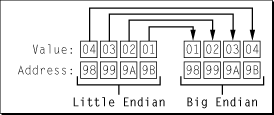Byte Swapping
If you need to find out the host byte order you can use the function CFByteOrderGetCurrent. The possible return values are CFByteOrderUnknown, CFByteOrderLittleEndian, and CFByteOrderBigEndian.
Contents:
Byte Swapping Integers
Byte Swapping Floating-Point Values
Byte Swapping Integers
Core Foundation provides three optimized primitive functions for byte swapping— CFSwapInt16, CFSwapInt32, and CFSwapInt64. All of the other swapping functions use these primitives to accomplish their work. In general you will not need to use these primitives directly.
Although the primitive swapping functions swap unconditionally, the higher level swapping functions are defined in such a way that they do nothing when a byte swap is not required—in other words, when the source and host byte orders are the same. For the integer types, these functions take the forms CFSwapXXXBigToHost and CFSwapXXXLittleToHost, CFSwapXXXHostToBig, and CFSwapXXXHostToLittle where XXX is a data type such as Int32. For example, if you were on a little-endian machine reading a 16-bit integer value from a network whose data is in network byte order (big-endian), you would use the function CFSwapInt16BigToHost. Listing 1 demonstrates this process.
Listing 1 Swapping a 16 bit Integer
SInt16 bigEndian16; |
SInt16 swapped16; |
// Swap a 16 bit value read from network. |
swapped16 = CFSwapInt16BigToHost(bigEndian16); |
The section “Byte Ordering” introduced the example of a simple C structure that was created and saved to disk on a little endian machine and then read from disk on a big-endian machine. In order to correct the situation, you must swap the bytes in each field. The code in Listing 2 demonstrates how you would use Core Foundation byte-swapping functions to accomplish this.
Listing 2 Byte swapping fields in a C structure
// Byte swap the values if necessary. |
aStruct.int1 = CFSwapInt32LittleToHost(aStruct.int1) |
aStruct.int2 = CFSwapInt32LittleToHost(aStruct.int2) |
Assuming a big-endian architecture, the functions used in Listing 2 would swap the bytes in each field. Figure 1 shows the effect of byte swapping on the field aStruct.int1. Note that the byte-swapping code would do nothing when run on a little-endian machine. The compiler should optimize out the code and leave the data untouched.
Byte Swapping Floating-Point Values
Even on a single platform there can be many different representations for floating-point values. Unless you are very careful, attempting to pass floating-point values across platform boundaries causes no end of headaches. To help you work with floating-point numbers, Core Foundation defines a set of functions and two special data types in addition to the integer-swapping functions. These functions allow you to encode 32-and 64-bit floating-point values in such a way that they can later be decoded and byte swapped if necessary. Listing 3 shows you how to encode a 64-bit floating-point number and Listing 4 shows how to decode it.
Listing 3 Encoding a Floating Point Value
Float64 myFloat64; |
CFSwappedFloat64 swappedFloat; |
// Encode the floating-point value. |
swappedFloat = CFConvertFloat64HostToSwapped(myFloat64); |
Listing 4 Decoding a floating-point value
Float64 myFloat64; |
CFSwappedFloat64 swappedFloat; |
// Decode the floating-point value. |
myFloat64 = CFConvertFloat64SwappedToHost(swappedFloat); |
The data types CFSwappedFloat32 and CFSwappedFloat64 contain floating point values in a canonical representation. A CFSwappedFloat is not itself a float, and should not be directly used as one. You can however send one to another process, save it to disk, or send it over a network. Because the format is converted to and from the canonical format by the conversion functions, there is no need for explicit swapping API. Byte swapping is taken care of for you during the format conversion if necessary.
© 2008 Apple Inc. All Rights Reserved. (Last updated: 2008-10-15)
